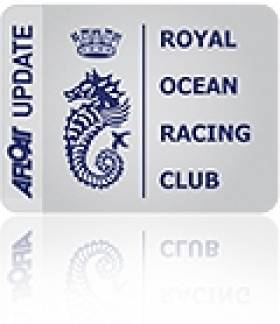Displaying items by tag: Tonerre
Round Ireland (Thurs 3pm). Can Inis Mor do it?
#roundireland – While the official tracker has Inis Mor as the overall leader in the 2012 Round Ireland Race, it's going to be a nail biting few hours for the French boat.
As of 3pm, Inis Mor has 30.6 miles to go. To beat Tonnerre she needs to cover that distance in five hours and 34 minutes. Simple math says she needs to average 5.49 knots and as she is making 5.7 knots just south of Lambay Island, it should work for her.
But, the 5.7 knots is not quite in the right direction – because the wind has headed her, she can only make 221° instead of the 190° she needs to reach Wicklow on one tack. So while 5.7 knots looks good, her actual progress towards the finish or VMG, is currently 5.4 knots – just outside the 5.49 knots needed.
To make matters worse, she is entering an area of stronger tides that will be directly against her for the last few hours into Wicklow. She can mitigate some of this by hugging the coast, but at what cost windwise?
Fascinating stuff, www.afloat.ie's money's on Tonnerre, at least in this battle. Keep an eye on Cavatina though – she still has a day left to win!
Round Ireland Winner Vroon Starts as Channel Race Favourite
Round Ireland Race Winner Piet Vroon’s Tonnerre de Breskens 3, who is leading the Season’s Points Championship by a country mile, starts as favourite for RORC's Channel Race in nine days time. It is the last RORC offshore race prior to the Sevenstar Round Britain and Ireland Race and some well known boats will be competing in the race which will last between 24-36 hours on a flexi-course. The top boat under IRC will win the Channel Challenge Cup and there are plenty of contenders.
In IRC Super Zero Derek Saunders’ CM 60, Venomous, will be hoping for strong winds to propel him to victory but John Merricks II are on a roll having just won the Cowes Dinard St Malo race and will be hard to beat.
Piet Vroon’s Tonnerre de Breskens 3, who is leading the Season’s Points Championship by a country mile, is back after winning the Round Ireland Race earlier this month. However John Shepherd’s Fair Do’s VII, Chris Radford’s Relentless on Incisor and Charles Ivill’s John B will also be looking for a good result in IRC Zero. All of these boats go head to head in IRC Zero for this race and the 1760 mile Sevenstar Round Britain and Ireland Race next month.
Scratch boat in IRC One is Neil Kipling’s J 122, Joopster, and they have some well known competition including RORC Commodore Andrew McIrvine and Peter Morton’s First 40, La Réponse. Andrew McIrvine is a seasoned offshore sailor and will also be campaigning his First 40 in this year’s Rolex Commodores’ Cup. He had this to say prior to the Channel Race: “Many of the entries are using this race as a pre-cursor to the Sevenstar Round Britain and Ireland Race, the biggest offshore race in the club’s calendar this year. It is a long hard race, last time out the boats beat nearly the whole way around the 1760 mile course; it tests the metal of everyone.”
The Army Sailing Association’s A 40, British Soldier, and Sailing Logic’s Reflex 38, Visit Malta Puma, are fighting it out to lead IRC One in the Season’s Points Championship and will both race round Britain and Ireland.
The top of IRC Two is dominated by two handed boats. In the Channel Race John Loden’s Psipsina and Peter Olden’s Solan Goose of Hamble will be looking for more success in the competitive class.
All three boats in IRC Three are at the top of the leader board. Matthias Kracht’s Ultreia! the Phoenix Yacht Club’s Spellbinder of Wytch, and Jean Yves Chateau’s Iromiguy are sure to have a close battle.
The Race Committee will decide the course the day before the start which will be designed to suit the prevailing wind conditions.






























































